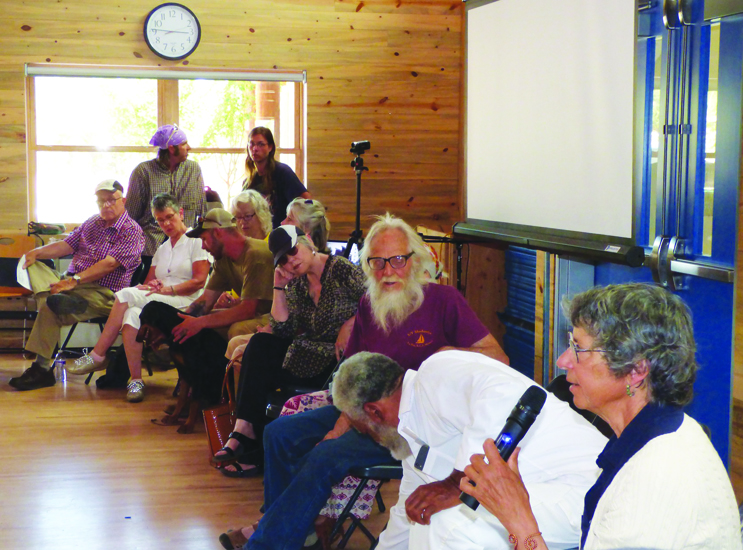Baca Grande residents address owner/builder issues

CRESTONE — About 70 Baca Grande property owners and builder hopefuls gathered Saturday at the Crestone Charter School to discuss ways to improve their relationship with the Baca Grande Property Owners Association (BGPOA) regarding the building process.
Many of those currently building on Baca Grande lots are owner/builders, singles or couples constructing their own homes from paycheck to paycheck, a process that can take not months, but sometimes years.
One of these is Thomas Schultz who helped organize the forum. Schultz worked with his wife, also friends and neighbors to advertise and coordinate the event. Wood-fired pizza was served with fixings donated by Elaine Johnson at the Mercantile. Live music set the tone for the event.
Attendees came hoping they could work something out with local and county officials to make the process less expensive and form a coalition that would support their efforts. They hope to lease property in the area to create a community land trust where residents can establish community gardens and a space for like-minded folks to meet, engage in projects and share their experiences.
Commissioner Jason Anderson, BGPOA Executive Director Ayla Hoevers, San Luis Valley Ecosystem Council Director Chris Canaly and Crestone Town Board Trustee Adam Kinney sat on a panel to answer questions for residents.
The gist of the suggestions and objections presented to the panel by various owner-builders were as follows.
• The BGPOA should consider donating land for a community land trust to benefit POA residents
• Residents need to see that more input reaches the ears of county commissioners.
• It is impossible to change the POA quorum or work out new parameters.
• Those who have attended POA meetings have not found resolution and often have not even been able to present their complaints.
• The POA may need to be disbanded.
• One option is collecting petitions to implement change.
• There is always recourse to the courts.
• Over 13 years have passed, various groups have complained, but it is hard to obtain information and no progress has been made.
• People owning more lots, whether living in or out of state, have more say as members than those actually living and/or building in the Baca Grande.
• Fees and deposits required by the POA are increasing and builders cannot pay them and afford to build at the same time.
• The POA charges a fee of $6,000 to owners who wish to live on their land as they build and extension fees (for building permits) have increased dramatically.
Because residents pay hefty POA dues, which recently increased, they feel that they should be getting better value for their investment.
In answering questions, Hoevers made no promises but did counsel builders to document everything they do. She said they could also write letters to the board and can request a membership list if they need to contact other members. She also said some board rules could change.
Hoevers said the lease of land suggested for a community trust from the POA would be “tricky.” She also pointed out that the fees came in the wake of many people who began to build, never finished their homes, and sometimes even abandoned them.
Kinney said others living in the Baca or who own land there have the right to be concerned about unfinished homes driving down property values.
Hoevers said the $1,500 deposit is eventually returned and so is the $6,000 fee. One attendee asked what is done with these fees and Hoevers said they are placed in the general fund. Auditors for Center and Saguache County have warned the governments that such a practice is not advisable.
Canaly told builders she would help them distribute petitions to have the building fees removed. A builder/owner herself, she said it is important to remember that resources are not as abundant now and money is scarcer.
When asked about documents of incorporation that suggest the POA is not legally constituted she denied that in the early 2000s, when her husband was on the board, anything was done that could bring the board into questions legally. Canaly also said the POA board has always been sound financially and vehemently denied there was any need for a forensic audit or any grounds for financial concerns.
A committee recommended such an audit last year after examining financial documents that drew several expenditures and shortfalls into question.
In conclusion, Anderson agreed to attend meetings held several times a year to continue the discussion. Other panel members pledged the same.
Schultz said he is now committed to creating a paper trail and holding regular meetings. “Everyone got to talk and people thanked me for it,” he said.



